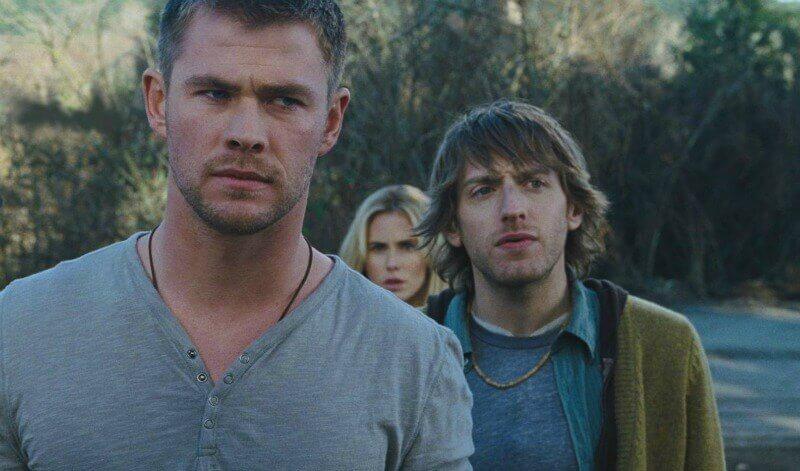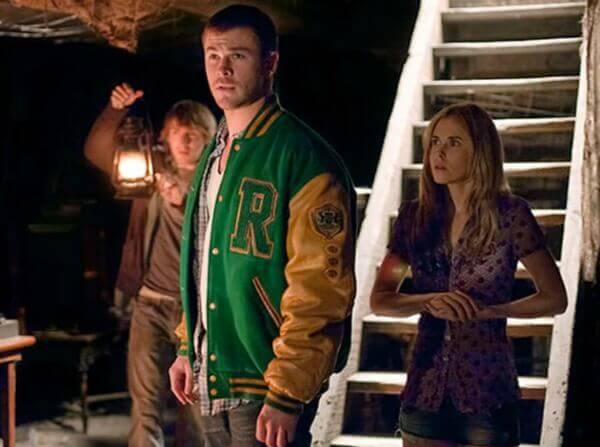For the record, I have not seen Cabin in the Woods. But I did read the script about 3 years ago (Jan. 30, 2009), so this post is based on that version of the script and the thoughts I wrote immediately following that reading (now refined a little). There’s definitely the possibility that this doesn’t accurately reflect the final film, but I think the discussion itself steps outside the nuts and bolts of this movie so I’m ok with that possibility.
And I fully intend to post an actual movie review when I watch it.

I have to admit I was really torn after I read Cabin in the Woods. On one hand it was Joss Whedon who I adore; who does smart work and is able to imbue significance into even his most flippant work; who can capture a moment of who we are as a society and give it back to us in a story with great dialog that helps us understand ourselves more clearly. A lot of those sorts of things were at work in Cabin in the Woods.
And yet, it was still a horror movie, which I’m not terribly fond of. Full of lots of blood and scary moments and horrible deaths and the kind of sex where even the girl thinks that’s all she’s good for.
Sex and violence are almost a requisit part of the horror film genre. So, how do you participate in the that without being exploitative? The easy way is for the director not to actually show a lot of what’s happening so it exists without being graphic. But does that evoke the same fear and terror which is presumably why people go see horror films? And this script has scene description that lets the audience see objectification, plenty of sex and enough violence, though not the violence porn that has been predominate in horror films that past decade or so.
“It’s basically a very loving hate letter.”
“I love being scared. I love that mixture of thrill, of horror, that objectification/identification thing of wanting definitely for the people to be all right but at the same time hoping they’ll go somewhere dark and face something awful,” [Joss] said. “The things that I don’t like are kids acting like idiots, the devolution of the horror movie into torture porn and into a long series of sadistic comeuppances. Drew and I both felt that the pendulum had swung a little too far in that direction.”
full interview here
If you’re really smart, and Joss Whedon is, you do Scream for a new generation. You take the cliches inherent in the genre, incorporate them but then give them substance and consequence. You show the audience that this is appalling and the only reason it’s being offered up is because we paid $10 to see it. That these are human sacrifices given to us to satisfy our revelry.
This script hints at that at the end of the second act but doesn’t quite follow all the way through with it into the third act. It made me ask, “What kind of twisted entity demands that these people be treated this way?” but never makes it unquestioningly clear that it’s us – that the real horror here is who we are and what we clamor for.

Cabin in the Woods points out the archtypical roles, very Breakfast Club, and interestingly enough has to force the characters into those archtypes rather than have them emerge from the cliche. But as interesting as that is, the blond is still objectified. The whore still has to die. “That the act of being a free, attractive, self-assertive woman is punishable by torture and death?” That’s Joss’ own question from this article at Whedonesque (really that whole post is worth reading). And I think Cabin in the Woods is his way of asking that question in a more visceral way. But how do you reconcile that with the script I just read? How far into what you’re commenting on do you go in order to be heard?
If you have a blonde who is perfectly nice and funny, why are you intent on her coming to a bad end? What is the purpose of the final girl, as she’s called? All these people, all the characters behave a certain way, and there is a progression of what they have to do, to allow themselves to be written off as sex fiends or druggies or bullies or complete idiots in the face of true danger, and you just don’t get in the way of that. It’s about being stereotypes versus fleshed-out people.
full interview here
Personally, I just didn’t think that the script went far enough to say that there’s something wrong with what you’re watching. all of it. But maybe the film does.
The only trouble [being vocal] ever caused me is that once you take a stance as a person, people are always using that as a yardstick in your work, which can be kind of limiting.
from here
And possibly the script didn’t take it that far because Joss wanted to comment without being all judgey. That was probably the better choice as an artist – in that whole an artist’s job is to make us ask the right questions, not provide answers sort of thing. But you know what? I’m judging us as a human race. Who are we that the objectification of women is not only ok, it’s entertainment? Who are we that we enjoy seeing people in pain and dying?
And how do we stop being that?